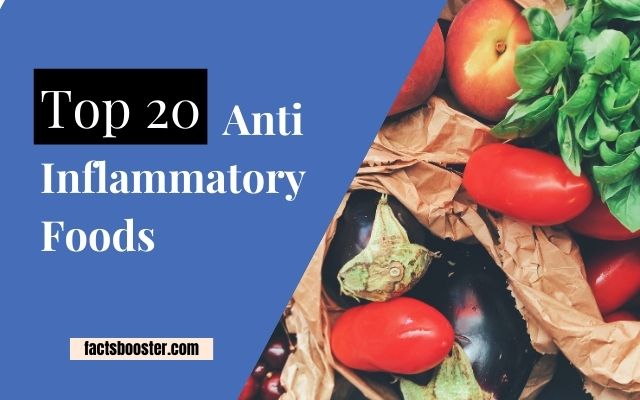In the quest for optimal health, adding anti inflammatory foods to your diet plays a pivotal role in combatting inflammation, a natural response by your body to injury and infection. However, when inflammation becomes chronic, it can lead to serious health issues. That’s where anti inflammatory foods come into play, acting as natural remedies to reduce inflammation and promote overall well-being. Incorporating these foods into a balanced diet is key to maintaining health and preventing disease.
Key Takeaways:
- Anti Inflammatory Foods: Vital for reducing chronic inflammation and enhancing health.
- Chronic Inflammation: Can cause serious health problems if not addressed.
- Balanced Diet: Integrating anti inflammatory foods is crucial for overall well-being.

Why Inflammation Matters
Inflammation isn’t always the villain it’s made out to be; in fact, it’s a crucial part of the body’s immune response. When you’re injured or fighting off an infection, inflammation is your body’s way of signaling the immune system to heal and repair damaged tissue, as well as defend itself against foreign invaders like viruses and bacteria. However, when inflammation becomes chronic, it’s a different story. This prolonged state of emergency can contribute to a range of health issues, from arthritis to heart disease, and even to depression and Alzheimer’s disease.
That’s where anti inflammatory foods step in. These foods are packed with powerful nutrients that help tame the flames of inflammation, bringing your body back into balance. By incorporating them into your diet, you’re not just cooling down chronic inflammation; you’re also fortifying your body against the diseases it can lead to. It’s a natural, tasty way to boost your health and protect your wellbeing.
The Power of Omega-3 Fatty Acids
Not all heroes wear capes—some come packed with omega-3 fatty acids. Found abundantly in certain anti inflammatory foods, these fatty acids are the unsung champions of our well-being. You’ve probably heard about them in relation to heart health, but their ability to combat inflammation deserves a spotlight of its own. By incorporating foods rich in omega-3s, like salmon, chia seeds, and walnuts, into our diets, we arm our bodies with the necessary tools to fend off inflammation with gusto. It’s not just about making a temporary change; it’s about embarking on a lifestyle that venerates the importance of these powerful nutrients. So, the next time you’re puzzled over how to reduce inflammation, remember that the solution might just be in your next meal.
Top 20 Anti Inflammatory Foods
Embarking on a journey to reduce inflammation in our bodies, it’s essential to integrate anti-inflammatory foods into our daily diet. These foods not only combat inflammation but also bolster our overall health. Here’s a rundown of the top 20 anti-inflammatory foods that you should consider adding to your meals:
- Salmon: Rich in omega-3 fatty acids, salmon helps reduce inflammation associated with chronic diseases.
- Blueberries: Packed with antioxidants, blueberries fend off inflammation and protect your body’s cells.
- Broccoli: As a cruciferous vegetable, broccoli is loaded with sulforaphane, an antioxidant that fights inflammation.
- Avocados: Loaded with potassium, magnesium, and heart-healthy monounsaturated fats, avocados can lower inflammation markers.
- Green tea: Famous for its inflammation-fighting catechins, green tea is a powerhouse of antioxidants.
- Peppers: Bell peppers and chili peppers are rich in vitamin C and antioxidants, reducing inflammation and promoting health.
- Mushrooms: Low in calories and high in selenium, mushrooms can help curb inflammation in the body.
- Grapes: Containing resveratrol and anthocyanins, grapes reduce inflammation and lower the risk of disease.
- Turmeric: Curcumin, a component in turmeric, is highly anti-inflammatory and can reduce inflammation markers significantly.
- Extra virgin olive oil: A staple in anti-inflammatory diets, extra virgin olive oil is rich in oleocanthal, which has properties similar to anti-inflammatory drugs.
- Dark chocolate: Cocoa, found in dark chocolate, is rich in antioxidants that can combat inflammation and improve heart health.
- Tomatoes: High in lycopene, tomatoes reduce inflammation and protect against cancer.
- Cherries: Sweet and sour cherries are rich in antioxidants, such as anthocyanins and catechins, which can fight inflammation.
- Spinach: High in antioxidants and vitamin E, spinach can reduce inflammation and oxidative stress.
- Almonds: Rich in vitamin E, magnesium, and monounsaturated fats, almonds are effective in reducing inflammation markers.
- Oranges: Packed with vitamin C, oranges can help prevent oxidative damage and lower inflammation.
- Black beans: Black beans are high in fiber and antioxidants, aiding in reducing inflammation.
- Walnuts: Walnuts contain omega-3 fatty acids, which can significantly reduce inflammation and promote brain health.
- Beets: Beets are high in antioxidants, such as betalains, which can reduce inflammation and protect cells from damage.
- Garlic: Garlic has been shown to have anti-inflammatory properties, which can help lower risk factors for heart disease and cancer.
Read more:
Incorporating Anti Inflammatory Foods into Your Diet
Integrating anti inflammatory foods into your diet doesn’t have to feel like a chore or a complete overhaul of your eating habits. It’s all about making small, yet impactful changes that can easily become part of your daily routine.
You can start by tossing a handful of berries or slices of avocado into your morning smoothie, or sprinkle some turmeric and ginger into your soups and stews for an extra inflammation-fighting punch. For lunch or dinner, consider replacing refined carbohydrates with whole grains like quinoa or farro, and aim to fill half your plate with a colorful variety of vegetables.
If you’re a snack lover, reach for nuts or seeds instead of processed options. And remember, hydration plays a crucial role too, so why not infuse your water with anti-inflammatory slices of cucumber or citrus fruits? These tweaks to your diet are simple, yet they can significantly aid in reducing inflammation.
Benefits Beyond Inflammation
But wait, there’s more to anti inflammatory foods than just easing inflammation. Delving deeper, these nutrient-rich heroes pack a punch well beyond their primary role. Imagine improving your heart health with every bite. Yes, you heard that right. By incorporating foods rich in omega-3 fatty acids and antioxidants, you’re not just fighting inflammation—you’re also building a fortress around your heart, protecting it from diseases that can sideline even the best of us.
And let’s not forget about chronic diseases. In today’s fast-paced world, they’re lurking around every corner, waiting to pounce. But here’s the good news: regularly feasting on anti inflammatory foods can be your shield. These dietary champions, laden with vitamins, minerals, and fiber, work tirelessly to fend off illnesses, helping you lead a life that’s not just healthy but vibrant too.
Potential Challenges and Considerations
It’s clear that integrating anti inflammatory foods into your diet can pivot towards a healthier lifestyle. However, it’s not without its hurdles. Allergies, for one, can be a significant barrier. Foods such as nuts, seeds, and seafood, which are staples in the anti inflammatory food list, are common allergens. Here, knowledge is power. Awareness of your specific allergies and seeking alternatives can keep you on track. Accessibility might be another challenge, especially when certain foods might not be readily available in your local markets or might stretch your budget.
- Allergies: If nuts are off the table for you, explore seeds like chia or flaxseeds as alternatives. Similarly, for those allergic to seafood, plant-based sources of omega-3 fats, like seaweeds and algae, can fill in the gap.
- Accessibility: When exotic fruits or specialty health foods seem out of reach, remember that local fruits and vegetables often carry similar anti-inflammatory benefits. Frozen fruits and veggies can also be a budget-friendly and equally nutritious option.
It’s about making informed choices and adjustments that align with your personal health and accessibility. With a bit of creativity and flexibility, surmounting these challenges is well within reach, paving the way for a more anti-inflammatory and health-forward diet.
Bottom Line
Embracing anti inflammatory foods isn’t just a dietary change—it’s a leap towards long-term health and wellness. Take control of your well-being by making these powerful foods a staple in your meals. The benefits are vast, from reducing inflammation to enhancing your overall health. Here’s to a vibrant, healthier you!
References:
1. Alexander Scheiber; Victoria Mank, October 28, 2023, “Anti-Inflammatory Diets” (1)
2. PubMed, 2022 Dec 6, “Effect of anti-inflammatory diets on inflammation markers in adult human populations: a systematic review of randomized controlled trials” (2)


